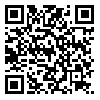

BibTeX | RIS | EndNote | Medlars | ProCite | Reference Manager | RefWorks
Send citation to:
URL: http://jdisabilstud.org/article-1-3312-en.html
2- Assistant Professor, Department of Psychology and Counselling, Farhangian University, Tehran, Iran
3- Assistant Professor, Department of Psychology, Babol University of Science and Technology, Mazandaran, Iran
4- MS in General Psychology, Ayatollah Amoli Branch, Islamic Azad University, Mazandaran, Iran
Abstract
Background & Objectives: Autism spectrum disorder (ASD) is one of the neurodevelopmental disorders of childhood that causes a lot of pressure and psychological tension in the family. ASD directly and indirectly affects family members. The mothers of these children face different challenges that expose them to negative psychological and emotional consequences. Research evidence shows that mothers of children with ASD and developmental disabilities experience a higher rate of mental health problems compared to other mothers. The mental health of mothers with autistic children is crucial because it affects their ability to adapt to the presence of a disabled child in the family. Some evidence suggests that not all mothers have an equal influence on their children. In other words, the ability of mothers to successfully respond to the problems of their children with autism is significantly different. Effective factors in families' resistance to stressful factors, including moderating factors such as resilience and the ability to withstand distress, should be considered. So, the present study aimed to assess the impact of logotherapy on the resilience and distress tolerance of mothers with children diagnosed with ASD.
Methods: The research method employed a quasi–experimental design with a pretest–posttest approach and a control group. The statistical population consisted of all mothers with children aged 3–15 years with ASD living in Babol City, Iran, who were under the supervision of the Welfare Department. Using the available sampling method, 30 eligible individuals were randomly assigned to two groups of 15 people each: experimental and control. The inclusion criteria were as follows: having a child with ASD, lacking mental health problems, not taking chronic psychiatric medications, and being able to attend educational sessions. The exclusion criteria for mothers were not meeting the inclusion criteria at any stage of the study, and missing more than two intervention sessions. The subjects were assured that all information collected would be kept confidential and used solely for research purposes. To respect privacy, the subjects were asked to refrain from mentioning their first and last names in the questionnaires. Additionally, ethical considerations, including the principle of scientific confidentiality, respect for the right to choose and be free, voluntary participation in the research, and the intellectual rights of the authors of the works, were observed. The study tools included the Connor–Davidson Resilience Scale (CD–RISC) (Connor & Davidson, 2003) and the Distress Tolerance Scale (Simons & Gaher, 2005). Data analysis was performed in two sections: descriptive statistics and inferential statistics in SPSS software version 18. In the descriptive statistics section, the mean and standard deviation were used, and in the inferential statistics section, the analysis of covariance test was employed. All statistical tests were analyzed in SPSS version 18 at a significance level of 0.05.
Results: The analysis of covariance revealed that logotherapy was effective in increasing the level of resilience and distress tolerance among mothers with children with autism (p < 0.001). According to the results of the eta square, 63% of the changes in resilience and 76% of the changes in distress tolerance of mothers were due to the logotherapy intervention.
Conclusion: According to the findings, logotherapy training increases the resilience and distress tolerance of mothers of children with ASD. Therefore, it is suggested that experts, along with other counseling methods, also utilize this educational program in counseling parents.
| Rights and permissions | |
 |
This work is licensed under a Creative Commons Attribution-NonCommercial 4.0 International License. |


